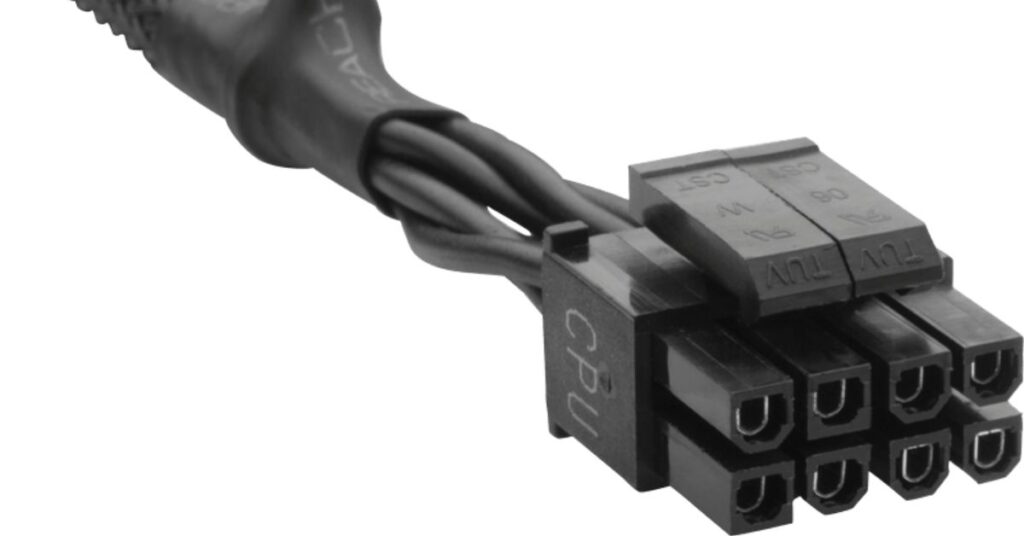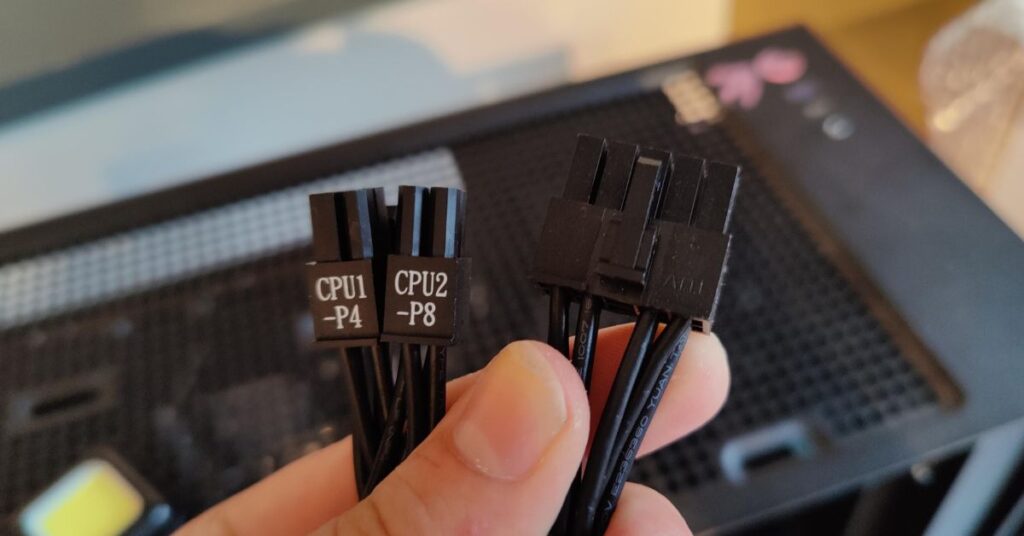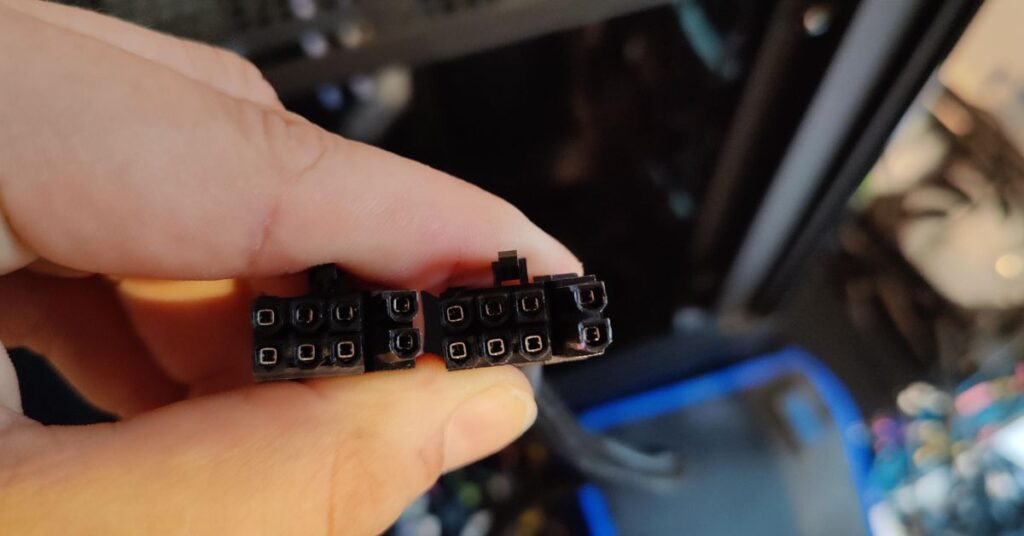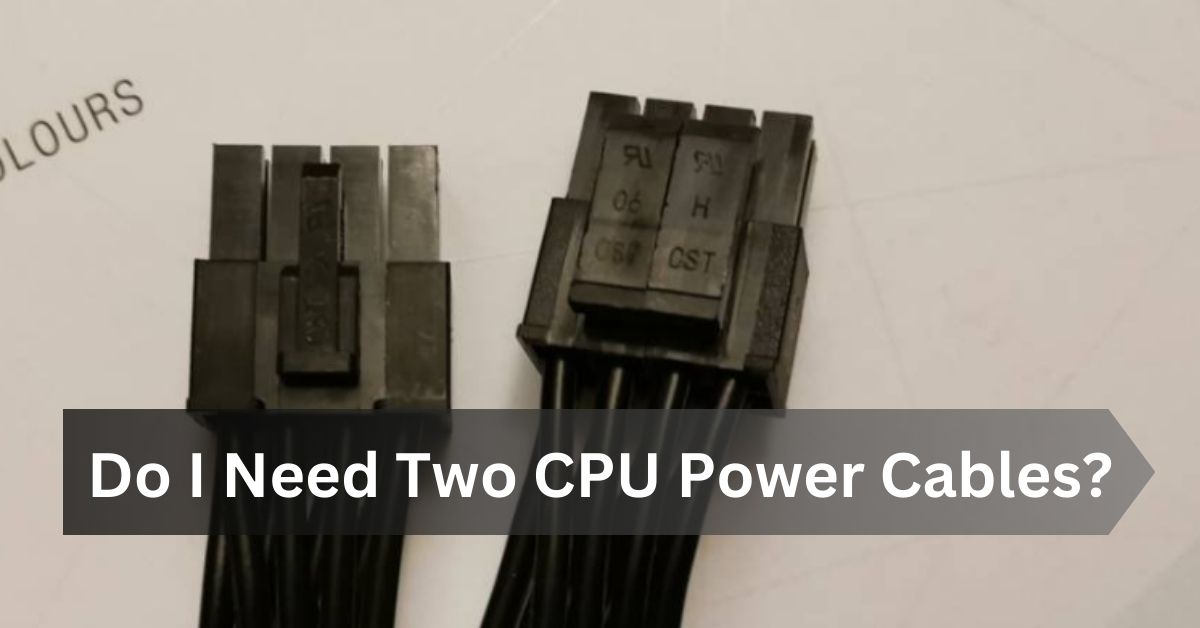Are you considering using two CPU strength cables instead of one when creating a high-performance PC or converting a current system?
The motherboard layout, your goals for multi-GPU or overclocking, and your CPU’s strength needs are some factors that determine the answer. Two CPU power lines can improve device balancing because modern, high-performance CPU’s have extended strength requirements.
If your CPU requires high wattage, two cables are recommended. However, mid-range or entry-level systems with lower power needs typically function well with a single CPU power cable. Let’s dive into the details to understand when dual CPU power cables are necessary and how they can enhance your system’s stability and performance.
Understanding CPU Power Cables:
Before exploring the reasons for the necessity of the two CPU power lines, let us explain the characteristics and importance of these cables. Your computer’s central processor unit (CPU) needs a consistent and reliable power supply for optimal performance.
CPU power cables, or EPS cables, are crucial for giving the CPU a consistent and sufficient power source. The CPU cable is to power the processor. Depending on the motherboard, the cable can have 4-pin, 8-pin, or sometimes a mix of 4- and 8-pin connectors.CPU power cables typically come in two types:
1. 4-Pin CPU Power Cable:
The four-pin CPU electricity cable, also known as the P4 connector, is a standard cable that provides the CPU with extra electricity. It is frequently found on older motherboards and is needed to provide energy to the CPU and ensure constant overall performance. The 4-pin ATX connector elements are the 3.3V, 5V, and 12V energy rails.
2. 8-Pin CPU Power Cable:

The 8-pin CPU power cable, frequently called the EPS connector, is designed to deliver additional electricity to modern CPU’s with elevated energy desires. Ensuring the CPU has sufficient strength to finish duties successfully is essential. The 8-pin EPS connector offers additional 12V and 3.3V strength rails.
Read More: What Games Are CPU Intensive?-Push Your CPU To The Limit
The Importance of a Proper Power Supply for CPU’s:
- Good, dependable energy delivery would help ensure the longest possible lifespan and optimal CPU efficiency.
- Unstable or inadequate power can cause several issues, including hardware damage, statistics loss, machine crashes, and decreased CPU lifetimes.
- A suitable power supply guarantees that the CPU operates smoothly under various workloads by providing constant voltage levels within the prescribed tolerances.
- Consider factors like wattage rating, efficiency certification (80 Plus), quantity and kind of connections (e.g., 8-pin EPS), and general build quality when selecting a power supply unit (PSU) for your CPU.
- Choosing a high-quality PSU with sufficient capacity and consistent output can help protect your CPU from power fluctuations and guarantee its long-term dependability.
Do You Need Two CPU Power Cables? Myth vs. Reality:
Many consider using two CPU electricity cables vital for imparting sufficient strength to the processor. But is that indeed the case?
1. Myth:
- For reliable and optimal performance, use two CPU power cables.
- Using two CPU power cables is always necessary for optimal performance.
- Dual CPU power cables are required to prevent heat damage or system crashes.
2. Reality:
- While utilizing two CPU power cables can offer benefits like improved power distribution and stability, it is only sometimes mandatory for every system configuration.
- Inadequate cooling or unsuitable hardware components are more likely to cause overheating or system crashes than the number of CPU power connectors used.
- In specific configurations, utilizing two CPU cables may yield little performance gain, and excessive cabling can create complexity that hinders maintenance and airflow.
When should you consider using two CPU power cables?

Two CPU power cables may be advantageous if your system is a high-end setup with several processors, severe overclocking, or power-hungry programs. In such cases, you need to ensure you are giving your system enough power by checking the power needs of your processor and consulting with the manufacturer of your power supply.
Read More: Why Is My GPU Underperforming?-Quick Guide To Know Why?
How Can You Tell If Two CPU Power Cables Are Needed for Your Computer?
See the instruction manual or specifications for your motherboard to determine if your system needs two CPU power cables. Before deciding whether you require two CPU cables, take into consideration the following:
1. Steps to Determine if You Need Two CPU Power Cables:
To determine whether you need two CPU power cables.
- First, consult the documentation that came with your motherboard. This documentation will typically specify how many CPU power cables are required for optimal performance.
- Refer to the producer’s guide to discover the recommended strength setup for your motherboard and CPU.
- Search for two 8-pin CPU power connectors on your motherboard. These connections are frequently found on high-performance or overclocking-friendly motherboards, indicating the necessity of two CPU power cords.
- Verifying your CPU and motherboard’s power needs is also possible. If your motherboard features multiple strength connectors or your CPU has ample wattage, you need two CPU power cables.
In conclusion, your particular system configuration and performance requirements will determine whether or not to employ two CPU power cables. Dual CPU power cables can benefit enthusiasts seeking maximum stability and efficiency from their systems. However, a single CPU power cable may suffice for standard users with moderate computing requirements.
Pros and Cons of Using Two CPU Power Cables:
Using two CPU power cables can offer several benefits and drawbacks that you should consider when setting up your system.
1. Benefits of Using Two CPU Power Cables:

- Increased power distribution:
Two separate power lines can more evenly balance the power demand over the CPU. This will guarantee that each cable supplies power gradually and consistently.
- Improved overall system stability and performance:
The second power pathway minimizes voltage fluctuations and enhances overall system stability and performance by reducing the load on a single wire.
2. Drawbacks of Using Two CPU Power Cables:
- Potential for cable clutter:
Adding an extra cable can contribute to cable clutter within your system, which may impact airflow, aesthetics, and ease of maintenance.
- Compatibility issues with specific configurations:
Some motherboards or CPU setups may not support or require dual CPU power connections, leading to potential compatibility issues if not configured correctly.
Read More: BIOS Update Needed For New CPU-Upgrade Alert! A How To Guide
FAQ’s:
1. Are there any specific instructions about the kind of CPU power cords I need to use?
Select reliable, high-quality CPU power cables compatible with your motherboard and PSU for optimum performance and security.
2. Do I need to utilize both CPU power sockets?
The second 8-pin connector provides additional power to the PCIe slots and supplies sufficient power for high-wattage CPU’s. Connecting the second 8-pin socket is typically only necessary if more than half of the PCIe slots are populated or if you run a CPU that consumes over 300 watts.
3. How do I know if my CPU requires dual power cables?
Check the CPU manufacturer’s specifications and recommendations for power supply requirements. Higher-end CPU’s with more cores for overclocking typically benefit from dual CPU power cables to ensure stable operation under heavy loads.
Conclusion:
Using two CPU power cables depends on your system’s requirements. Dual cables can enhance power distribution, stability, and performance in specific configurations.
Ensuring that your power supply can support the demands of your CPU will significantly boost your system’s performance. Remember these tips to optimize your CPU’s performance and maximize its capabilities.
